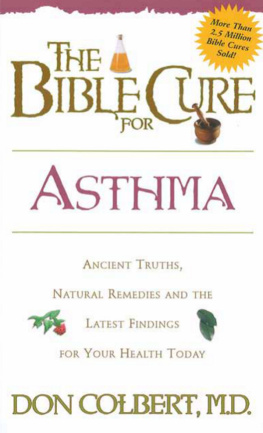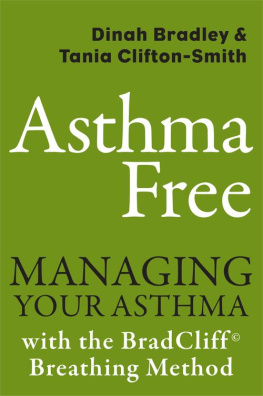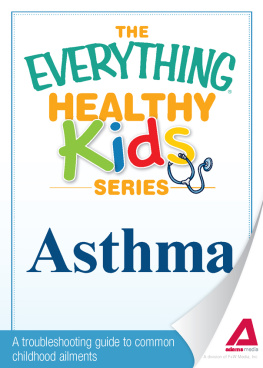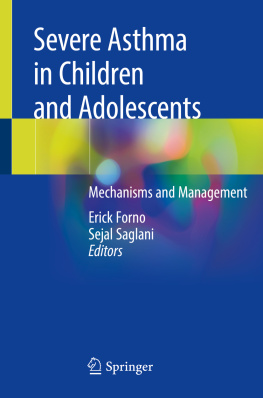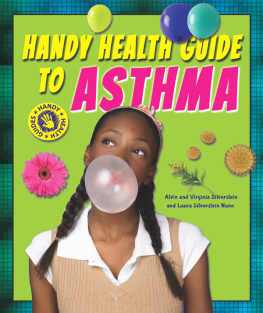Stanford University Press
Stanford, California
2017 by the Board of Trustees of the Leland Stanford Junior University. All rights reserved.
No part of this book may be reproduced or transmitted in any form or by any means, electronic or mechanical, including photocopying and recording, or in any information storage or retrieval system without the prior written permission of Stanford University Press.
Printed in the United States of America on acid-free, archival-quality paper
Library of Congress Cataloging-in-Publication Data
Names: Trnka, Susanna, author.
Title: One blue child : asthma, responsibility, and the politics of global health / Susanna Trnka.
Other titles: Anthropology of policy (Stanford, Calif.)
Description: Stanford, California : Stanford University Press, 2017. | Series: Anthropology of policy | Includes bibliographical references and index.
Identifiers: LCCN 2016053569 (print) | LCCN 2016054563 (ebook) | ISBN 9781503601130 (cloth : alk. paper) | ISBN 9781503602458 (pbk. : alk. paper) | ISBN 9781503602465 (e-book)
Subjects: LCSH: Asthma in childrenGovernment policyNew Zealand. | Asthma in childrenGovernment policyCzech Republic. | Asthma in childrenTreatmentNew Zealand. | Asthma in childrenTreatmentCzech Republic. | Medical policyNew Zealand. | Medical policyCzech Republic. | ResponsibilityNew Zealand. | ResponsibilityCzech Republic.
Classification: LCC RJ436.A8 T76 2017 (print) | LCC RJ436.A8 (ebook) | DDC 362.196/2380094371dc23
LC record available at https://lccn.loc.gov/2016053569
Cover photo by Pavel Sonnek. Reprinted courtesy of Denk/Pavel Sonnek.
Typeset by Thompson Type in 10.25/15 Brill
Preface
THE impetus for this book was a research trip gone wrong. In 2006 I arrived in Prague, planning to spend a few months conducting research on Czechs memories of state socialism. I was accompanied by my two young daughters. Within hours of our arrival, I was sitting in the back of an ambulance watching my nine-year-old being hooked up to a nebulizer in the midst of her first-ever asthma attack. Soon after we had stepped into our rented apartment, she had succumbed to a coughing fit that left her lips literally turning blue, effectively becoming one of the Czech Republics blue children, as they were later called by a public health specialist I interviewed. By luck there was a pediatrician living in the same building who tried to get my daughters breathing under control. I watched in horror as, after administering Ventolin (an emergency reliever bronchodilator, one of the most popular on the market) and prednisone (a strong, oral corticosteroid), the doctor shouted into her cellphone that the ambulance driver better hurry up or we would have a death on our hands. Your daughter was one of the few asthma cases I thought might pass away on me, she later explained.
Once she was released from hospital, my daughter was put under the supervision of a local respiratory specialist who immediately proceeded to conduct a spirometry test (a basic lung function test) and a wide range of allergy skin prick tests. Over the next three weeks, various pharmaceutical concoctions, followed by repeat spirometry tests, were tried out until she was deemed stable enough to travel home. In the meantime, I received strict instructions on how to administer her care, including the necessity of spending as much time as possible outside of the city. You must take her condition very seriously, the respiratory specialist admonished me, and ensure she continues to have regular checkups and spirometry, and only specialist care.
How could I not? I wondered.
But almost overnight, we transitioned from a situation of high drama where we were repeatedly told we were dealing with a serious, deadly disease that needed careful and constant attention to a context where asthmawhile still disruptive and potentially lethalwas considered a much more mundane part of everyday life. When we arrived back home in New Zealand, we visited our family physician, who took a look at the medication we had received, wrote us some refill prescriptions, and told us to carry on with what we were doing. When I asked when the next spirometry test would next take place, he laughed and explained how rarely spirometry is conducted in New Zealand. He then asked to view one of my daughters spirometry printouts as he had never seen one before. For the next few years, we regularly phoned his office to get repeats on her prescriptions, never being asked to come in for a checkup. The one time we insisted on an annual asthma review, we were summarily informed it was a waste of the doctors time to check her when nothing was actually wrong with her breathing. It didnt take long to realize that in New Zealand my daughter, and by extension her father and I, were expected to oversee her care, seeking medical assistance only if her medication wasnt working properly.
As a medical anthropologist, I was well acquainted with the idea that similar health conditions may be responded to very differently in diverse cultural and sociopolitical contexts, but the more I looked into it, the less different the Czech medical system seemed to be from New Zealands. Both countries share the same standards of technologically driven biomedical care, with a combination of predominantly public (that is, state-funded) services and private care. There is remarkable similarity in the availability of pharmaceuticals and technologies (such as spirometry and exhaled nitric oxide tests) but, as this book documents, distinct differences in how they are put to use.
Even more significantly, both countries are signatories to the same set of worldwide asthma guidelines established by the Global Initiative for Asthma (GINA). Following GINA, they have adopted policies for asthma care that focus on self-management and highlight the role of the patient in overseeing his or her own care. Indeed, in both countries, political and economic reforms have promoted the benefits of increased self-responsibility not only in the domain of health care, but as part of the broader reshaping of citizenstate relations.
But in trying to understand the meanings and effects of global and national policies promoting self-management and, more broadly, individual responsibility, the puzzle only deepened as I found myself facing even more contradictions in how the same disease was seen and treated in two different contexts. Although the Czech Republic has growing rates of childhood asthma, it is hardly a world leader in this area, and yet asthma is a topic that generates widespread public concern, bringing activists out onto the streets and firing up debate in Parliament. In contrast, New Zealand tops worldwide rates of childhood asthma, but one is hard-pressed to find much public debate, much less public mobilization, over how the nation should respond to a condition affecting nearly 25 percent of its children.
This book endeavors to shed light on these dynamics by looking beyond the rhetoric of policies promoting neoliberal reforms to consider the multiple, and sometimes conflicting, realities of how such policies are enacted in practice. I have chosen two divergent case studies to spotlight these differences, but, in many respects, the New Zealand example represents dynamics that are occurring across Western liberal democracies, particularly English-speaking nations, and readers in the United States, Great Britain, and Australia will spot close similarities with the health-care systems in their own countries. Likewise, although there are culturally specific inflections to it, the Czech ethnography could have been conducted in other parts of Central and Eastern Europe. The purpose of this study is thus not to compare childhood asthma in New Zealand and the Czech Republic per se but to consider two different versions of how neoliberal health reforms and policies promoting individual responsibility are being enacted. Engaging in such an explicitly cross-cultural examination enables us to see how culture, social organization, and political-economic histories intersect with policy and reform agendas, resulting in distinctive forms of familial, medical, scientific, and state practice. It also reveals the wide range of what is


